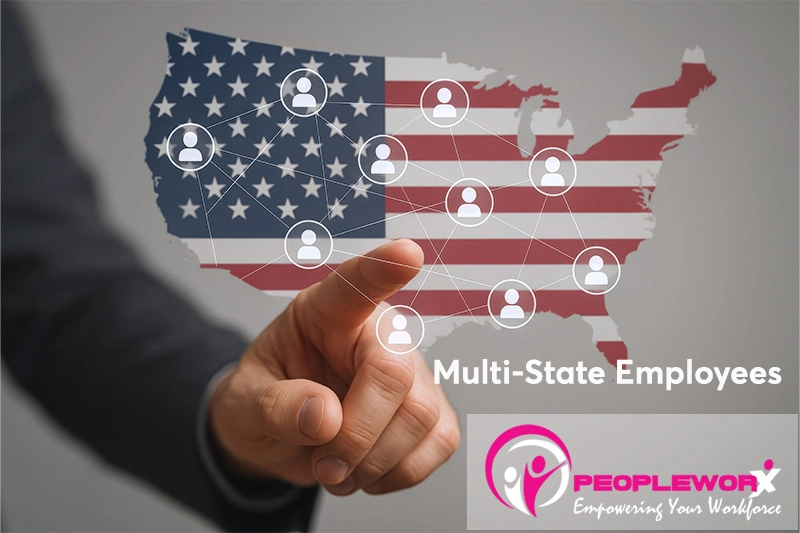Remote and distributed work are no longer edge cases. For many small and mid-sized employers, a single new hire across a state line, or an existing employee who moves, quietly expands your compliance footprint. Payroll still runs and people still get paid, but the rules that govern those paychecks follow where work is performed, not where your headquarters sits. That basic idea drives nearly every downstream obligation you’ll shoulder this year: income-tax withholding and the outliers to it, city-level payroll taxes, wage-and-hour standards, paid leave mandates, and unemployment insurance. Getting those right isn’t about being perfect, it’s about designing practical controls that work at the pace of your business.
This guide translates the moving parts into operational decisions, with examples from the jurisdictions that most often surprise SMBs.
Content
- “Where the work happens” is the default, with notable exceptions
- Payroll examples that surface the risk, so you can engineer it out
- Wage-and-hour and leave laws don’t travel with the employee, your policies must
- Unemployment insurance (SUI): pick the right state once and only once
- How to industrialize compliance without overbuilding bureaucracy
- What “good” looks like in the first 30–60 days of multi-state expansion
- Red flags worth escalating beyond “just payroll”
- A closing word on governance: small teams can still be rigorous
- Frequently Asked Questions: Multi-State Payroll & Compliance
1) “Where the work happens” is the default, with notable exceptions
As a rule of thumb, states tax wages where the employee performs services. If your Seattle-based salesperson spends three days a week working from a home in Denver, Colorado law expects you to treat that as Colorado work for withholding purposes and, if thresholds are met, address local obligations such as Denver’s Occupational Privilege Tax (a flat monthly “head tax” triggered when an individual earns at least $500 in a calendar month for work performed in Denver; the employee portion is $5.75/month, and the employer pays $4.00/month).
Philadelphia offers another instructive example: its Wage Tax applies based on city rules that sit on top of Pennsylvania state tax. Employers with covered wages must register and withhold at the city’s published rates for residents and nonresidents (updated annually and tied to recent structural changes enacted by city leadership). For multi-state or hybrid teams, that means your HRIS needs to track work location down to the municipality when relevant, not just the state.
Two widely misunderstood exceptions modify that “where work happens” default:
- Reciprocity agreements. Certain border states agree that each taxes only its residents on wages earned in the other, if the employee files the right exemption form. In the Washington, D.C. region, for example, Virginia has reciprocity with D.C., Maryland, Pennsylvania, West Virginia, and Kentucky. That means a Virginia resident working in D.C. can generally have Virginia, not D.C., income tax withheld, again, with the correct paperwork on file. Your process needs to surface and retain those certificates during onboarding and whenever addresses change.
- “Convenience of the employer” (COE) rules. A handful of states treat days an employee works elsewhere as if they were worked in the employer’s state unless the arrangement is for the employer’s business necessity (not the employee’s preference). New York is the best-known example, and both Connecticut and New Jersey now apply “reciprocal” versions of the rule: they generally apply COE only when the other state does. If you have a nonresident employee working at home by choice, COE can create double-withholding risk if you fail to document employer necessity and set up sourcing correctly.
Operational takeaway: build a “location logic” that first asks where services were actually performed, then checks (1) whether a reciprocity agreement applies and you’ve collected the exemption, and (2) whether COE will override the physical-presence result and require documentation of employer necessity.

2) Payroll examples that surface the risk, so you can engineer it out
Example A: The Denver project.
You engage a remote designer in suburban Colorado. For two months she spends three days per week inside Denver city limits with the client. In each month she earns more than $500 attributable to Denver work. Your obligations now include withholding the employee’s $5.75 monthly Occupational Privilege Tax and remitting the employer’s $4.00 monthly portion for each month the threshold is met. This is independent of Colorado state income-tax withholding. If your time and attendance app doesn’t capture work location reliably, you’ll miss the local tax and create a reconcile-and-amend project later.
Example B: The NYC-based manager, NJ resident.
Your company is in Manhattan; your manager moved to New Jersey and works at home most days. New York’s COE rule sources many of those WFH days to New York unless you can show it’s an employer necessity (e.g., no assigned desk or a written policy requiring WFH due to business need). New Jersey has enacted its own COE framework and separate guidance, so you’ll want to coordinate withholding and credits and, importantly, keep clean documentation of the business rationale for remote work. In practice, this is a policy problem as much as a payroll configuration problem.
Example C: The Philly hybrid hire.
A Delaware company hires a Philadelphia resident who splits time between a Delaware site and home in Philadelphia. You may face Philadelphia Wage Tax on Philadelphia workdays and Delaware withholding when work is performed in Delaware, plus Pennsylvania personal returns for the employee. Getting this right requires precise day-counting and city-level setup.
3) Wage-and-hour and leave laws don’t travel with the employee, your policies must
Even if your withholding is perfect, wage-and-hour and leave rules vary widely by state and sometimes by city. The most common (and costly) traps for multi-state SMBs are applying a single national policy where a state requires more.
- Daily overtime and break rules. California still requires overtime after 8 hours in a day (and double time after 12), and its meal/rest break rules carry monetary penalties if violated. If your handbook or scheduling app assumes “weekly overtime only,” your California employees are almost certainly accruing underpayments, and you won’t see it until a demand letter arrives. Encode California-specific rules into your timekeeping and scheduling tools, not just in a PDF handbook.
- Paid sick leave and paid family & medical leave (PFML). The United States still lacks a national PFML program, so states have filled the gap with their own designs. As of late 2025/early 2026, more states have active or imminent PFML programs (with contributions, eligibility, and wage-replacement formulas that differ), and adoption is still expanding. Expect annual adjustments and new entrants (for example, Minnesota’s PFML program is slated to begin in 2026; several other states have programs in place or phasing in). For multi-state employers, the right move is to maintain a jurisdiction matrix and wire those rules into your HRIS accrual engines and payroll deductions.
Operational takeaway: build policy to the most protective applicable standard you intend to apply, then configure systems by jurisdiction. Train supervisors where scheduling or breaks differ, and audit timecards against local rules (don’t rely on employee self-policing).
4) Unemployment insurance (SUI): pick the right state once and only once
Unlike withholding, state unemployment insurance for a given employee should belong to a single state at a time. To prevent double coverage (or none at all), every state has adopted the Localization of Work framework memorialized by the U.S. Department of Labor. You apply a four-step test: (1) localization of services, (2) base of operations, (3) place of direction and control, (4) employee residence, moving down the list only if the prior test doesn’t settle it. Get this wrong and you’ll misreport wages, distort experience ratings, and in some cases draw penalties.
Two budgeting points matter in 2026. First, state taxable wage bases differ sharply and many are indexed, so the same comp plan can cost you materially more in one state than another. Second, several jurisdictions updated their wage bases for 2026; build those deltas into your labor forecasts now rather than discovering them at quarter-end. Use current reference charts from reputable payroll and tax sources to set expectations with finance.
5) How to industrialize compliance without overbuilding bureaucracy
Design for location. At onboarding and whenever a job or address changes, capture the primary work location and any anticipated secondary locations. If your workforce travels or hybrid-works, incorporate location confirmation in timekeeping (geo-prompts or project/site codes). That’s how you catch city taxes like Philadelphia’s Wage Tax and Denver’s OPT in real time rather than by audit.
Engineer reciprocity and COE into the workflow. When an address hits a reciprocity pair (e.g., a Virginia resident working in D.C. or Maryland), your onboarding checklist should automatically surface the proper exemption form and store it with the employee’s tax setup. When an employee works for a COE-state employer and lives elsewhere, prompt for employer necessity documentation and route it for approval so payroll can source correctly. The goal is to reduce the number of judgment calls your team makes off-cycle.
Make leave and wage-and-hour differences visible. Embed California’s daily overtime rules and meal/rest requirements in your scheduling and timekeeping logic if you employ anyone in the state; do not rely on “manager knowledge.” As your footprint grows into PFML states, ensure payroll deductions and leave accruals turn on by jurisdiction and align with your handbook promises.
Reconcile early, and predict costs. At the first payroll after a footprint change, compare actual results to a “parallel run” based on expected tax and benefit settings. For finance leaders, translate compliance into dollars: show how a hire in State A vs. State B affects SUI cost given the current wage bases. That earns credibility and reduces surprises.

6) What “good” looks like in the first 30–60 days of multi-state expansion
Week 1–2: Inventory and register.
List every employee’s actual work locations by state, and city where relevant. Open or confirm registration for state withholding and SUI where services are performed, then check for city registrations (e.g., Philadelphia employer wage tax account; Denver OPT). If your team works in Ohio municipalities, remember many cities collect through RITA and require separate setup and filing.
Week 3–4: Configure and test.
Turn on reciprocity flags where you have exemption certificates on file (e.g., Virginia reciprocity cases). Where COE could apply, ensure the personnel file contains employer-necessity documentation; if not, source to the employer’s state as required and educate the business on the implication. Run a parallel payroll for tricky cases (hybrid city work, COE vs. physical presence).
Week 5–8: Formalize policy and train managers.
Refresh your handbook and manager guides where local rules diverge, California overtime and breaks, PFML contributions and eligibility, city wage taxes, and teach supervisors how scheduling and timeclock behaviors affect compliance (e.g., missed meal breaks generate premiums; off-site days may trigger city taxes). Audit the first full cycle against expectations and capture exceptions while memories are fresh.
7) Red flags worth escalating beyond “just payroll”
- Double-tax risk from COE. Any nonresident working for an employer in New York (or a retaliatory COE state) without written employer-necessity support is a candidate for mis-sourced withholding and potential audits. Escalate early; the fix is part tax, part policy.
- City payroll taxes you didn’t know you owed. Philadelphia Wage Tax and Denver OPT become visible only when you track where services were performed. If your system can’t do that, you’re relying on luck.
- One-size-fits-all wage-and-hour rules. If your handbook still says “overtime after 40” with no California carve-outs, you’re carrying contingent wage liability. Treat this as a systems issue, not a training issue.
- SUI reported to multiple states for the same employee. This usually indicates the DOL’s Localization of Work test wasn’t applied. Reconcile and correct before quarterly filings compound the problem.
8) A closing word on governance: small teams can still be rigorous
You don’t need a large compliance department to manage a multi-state footprint, you need clarity and automation in a few high-leverage places: collecting the right forms at the right time (reciprocity, COE documentation), encoding location into timekeeping, applying the DOL four-part SUI test consistently, and configuring leave and wage rules by jurisdiction. The rest is cadence: register promptly, reconcile the first run, and revisit your matrix when laws change.
If you’d like to explore the mechanics behind these controls, policy templates, leave matrices, and onboarding checklists, visit our HR microsite. To gauge your current exposure and prioritize fixes, take the HR Risk Assessment (it’s a fast way to surface gaps before they become penalties or rework).

Final Thoughts: Growth Shouldn’t Increase Anxiety
Hiring across state lines is a sign your business is evolving.
But without the right payroll foundation, growth can quietly introduce risk that’s hard to unwind later.
With PeopleWorX, you don’t just process payroll, you gain confidence that your business is paying people correctly, complying with state laws, and building trust with employees wherever they work.
Explore how PeopleWorX simplifies multi-state payroll and tax compliance.
Frequently Asked Questions: Multi-State Payroll & Compliance
What makes multi-state payroll so complicated?
Each state has its own tax laws, filing schedules, and labor regulations. Employers must comply with the rules of the state where work is performed, not just where the business is located.
Do I need to register tax accounts in every state where employees work?
In most cases, yes. Employers typically must register for withholding and unemployment tax accounts in each state where employees perform work.
Can one payroll system handle multiple states?
Yes, if it is designed for multi-state compliance and continuously updated. A properly configured system can automate calculations, filings, and reporting across states.
How do reciprocity agreements affect payroll taxes?
Some states allow residents to pay income tax in their home state instead of the work state. Payroll systems must be configured correctly to reflect these agreements.
When should I seek HR guidance instead of payroll support?
If the issue involves classification, policy enforcement, employee disputes, or documentation gaps, HR guidance should come first, before errors escalate.
If you need help with workforce management, please contact PeopleWorX at 240-699-0060 | 1-888-929-2729 or email us at HR@peopleworx.io
Stop Multi-State Mistakes Before They Get Expensive
Multi-state teams face shifting tax, wage/leave, and filing rules, misses get pricey. Read “Multi-State Employees: How to Eliminate Payroll & Compliance Headaches Before They Cost You,” then take our under one minute HR Risk Assessment to find gaps and get a prioritized fix, backed by PeopleWorX experts.
Take Your HR Risk Assessment →





